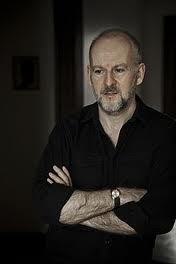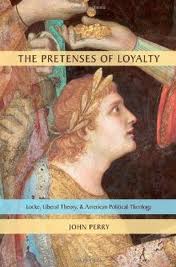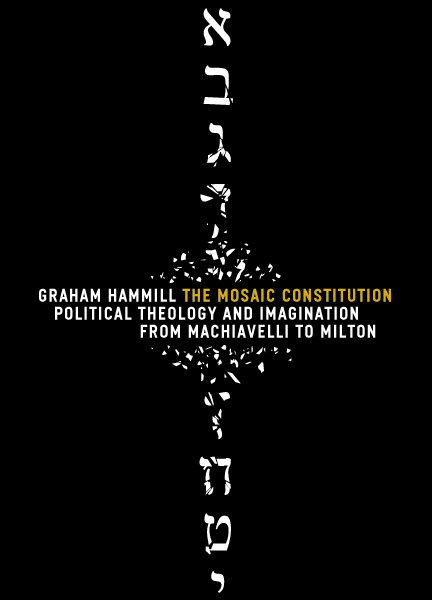
In this interview Simon Critchley discusses his new book, “The Faith of the Faithless: Experiments in Political Theology,” with Dave True of Political Theology. Along the way Critchley touches on an array of topics: his respect for religion, the experimental nature of free thought, what love has to do with a politics of resistance, the genius of the Occupy Movement, nonviolence and its limits, the wisdom of Antonio Gramsci, and the illusions of Marxism. Earlier responses to the book can be accessed….

John Perry’s recent book “The Pretenses of Loyalty” offers a clear, penetrating, and persuasive diagnosis of the predicament of contemporary liberal political theory through consideration not only of its present tensions, but more importantly, of its amnesia regarding its historical foundations. I say clear because Perry’s exposition is tightly focused, lucidly written, and structured so as to ensure ease of understanding. By missing no opportunity to repeat his main thesis and the key issues at stake, he walks a fine line, to be sure, between assisting and insulting his readers, but ultimately avoids the latter in my judgment. The diagnosis is penetrating because it does not rest content with surveying the ongoing contemporary conflicts between politics and religion and the critiques marshaled by communitarian theorists such as Michael Sandel and Stanley Fish—though he does this admirably in the first two chapters—but digs right down to the historical roots of liberal theory, the amnesia of which, he argues, is largely responsible for its present predicament….
‘…as the food is set…a solid thumb and forefinger tears thunderous grey bread.’
For those of us who are inheritors of the Judeo-Christian tradition the word ‘bread’ crackles with connotation. Out of the simple truth that bread is one of the traditional staples of human living, endless symbolism flows: Bread can signify our basic human need for nourishment, it can act as a sign of the work of human hands and so on. Bread can be torn, scattered and gathered and, even in Rowan Williams’ poem Emmaus (quoted above), made to thunder. If some might treat ‘bread’ as a tired, overworked metaphor it also takes us to the heart of the Christian faith. The bread of the Eucharistic feast is no mere sign, it is sacrament….
The scathing criticisms of private property that we find in the mouth of Jesus are well-known. “Go, sell what you have,” he tells the rich man who asks for the secret of eternal life (Mark 10:21; Matthew 19:21; see also Luke 12:33). Again and again, we encounter the polemic against property, the possession of which is regarded as an evil and as a massive hindrance to joining the kingdom of God. Jesus valorises simplicity over luxury and forgoes the influence and power that comes with wealth. In short, everything about him stands against the deep values of the Hellenistic propertied classes. In the words of G.E.M. de Ste. Croix, “I am tempted to say that in this respect the opinions of Jesus were nearer to those of Bertholt Brecht than to those held by some of the Fathers of the Church and by some Christians today” (Ste. Croix 1981: 433).
I am less interested here in the twisting and turning by later exegetes to ameliorate these embarrassing texts, and my concern for now is not the Christian communist tradition that finds inspiration in these and other texts (Acts 2:44-5; 4:32-5). Instead, I suggest that this implacable opposition to property has a far deeper reason. Simply put, the very definition of private property, invented by the Romans a little over a century before the time of Jesus, is based upon slavery. That is, private property relies on the reduction of one human being to the status of thing (res) that is “owned” by another human being. Let me explain…..
There are few terms that evoke greater distrust among many wise and sceptical people on both sides of the Atlantic right now than ‘faith-based politics’. A large part of that distrust comes from an awareness of the potency and even toxicity that can arise from religious or ideological emotion and commitment – and not just among those whose beliefs (religious or otherwise) are other than, or opposite to, our own….
Over the summer posts on this blog have discussed Giorgio Agamben’s The Kingdom and the Glory. Longer versions of some of these posts will be featured in an upcoming issue of the print version of Political Theology.
Here are links to each of the online contributions to the symposium: […]
In the aftermath of the Episcopal Church (USetc)’s General Convention, there’s been a flurry of breast-beating, moaning, finger-pointing, boasting, and other edifying demonstrations of ecclesiastical vitality (or not) in the various social media sites….
I’m a liberal, but I don’t want to be in a liberal church, because liberals unchecked are prone to do stupid things. And I think the same holds true for conservatives that want to make a ghetto for themselves on the right. These would be terrible developments for the church to split ourselves the way some on the right are advocating. In the kingdom of God, the church will have every ideological stripe.
The author of Ephesians is addressing the conflict between Jew and Gentile Christians (“the cut/circumcised” and “the uncut/uncircumcised”). The politics of this text could be boiled down to the first century conflict between these two groups. It’s a definition so basic and so simple that it belongs in a Politics 101 course. Where it gets interesting, however, is not how one defines the conflict, but how the author of Ephesians deals with it…..
The conservatives did what they had to do to win. They ran out the clock, wore people down, kept their troops in line, and ultimately prevailed thereby. Not letting the Assembly debate the issue of the Authoritative Interpretation, however, is going to be a costly mistake. My sense is that commissioners thought that this is something like the ordination question that we debated for so many years. People could get only so far in one Assembly on that issue, but would reach an impasse, whereupon folks would realize that it would just have to wait until the next Assembly to get to the next step. But marriage is very different from ordination. Councils of the church perform ordinations, so you have to get a group of people to agree to move forward. Marriages, however, are performed by individual pastors. And the emotion surrounding a marriage is way higher than any ordination.
When the Committee on Middle East Peace finally made its motion to divest–you guessed it– a substitute motion was made, not divest but rather to invest in the Occupied West Bank. This was a masterstroke of polity, but a completely ridiculous proposal of policy. Presbyterians suffer from congenital niceness, which is the main reason that it had taken us eight years even to get to the point where we could make the least confrontational action possible on the issue, selling our own stocks and bonds.
